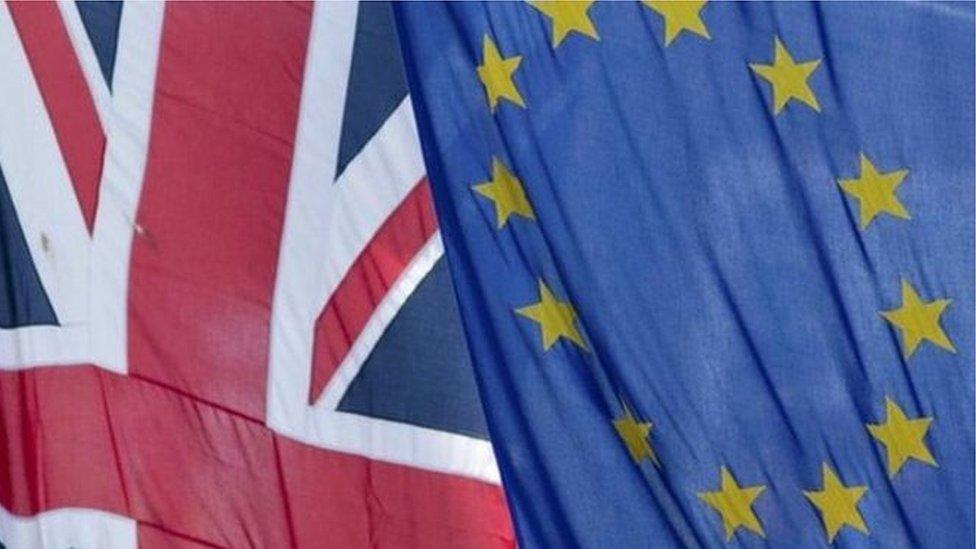Q&A: The EU and Northern Ireland
- Published

Polls suggest nationalists overwhelmingly want the UK to remain in the EU, while a majority of unionists are in favour of leaving
Who wants the UK to stay in the EU?
Sinn Féin, the SDLP, the Ulster Unionists, Alliance and the Green Party, as well as the Irish government, are campaigning for a remain vote.
Who wants the UK to leave the EU?
The DUP, the TUV and the left-wing People Before Profit party are campaigning for a leave vote.
What about businesses?
Big business - with a few exceptions - tends to be in favour of Britain staying in the EU because it makes it easier for them to move money, people and products around the world.
Bombardier, Northern Ireland's largest manufacturing employer, has told its staff "it is better for our company that the UK remains within the EU".
Many major Northern Ireland business organisations are officially neutral, as is the Ulster Farmers Union.
The most high-profile local businessman in favour of Brexit is William Wright, the founder of bus-maker Wrightbus. He said he was concerned about immigration and the UK would be better off going it alone.
How much does Northern Ireland contribute to the EU and how much do we get in return?
The UK made a gross contribution of £12.9bn in 2015. Northern Ireland has about 3% of the UK's population so its contribution can be estimated at £374m.
In terms of what comes back, subsidies for farming and fishing, alongside structural funds were £320m in 2015.
Special peace and cross-border funds added about £50m - though we'll stop getting much of that money after 2020.
There are also science, education and research funds - they're at least £10m a year.
So Northern Ireland is probably still a beneficiary of the EU, or at the very least breaks even.
What would happen with the Irish border if the the UK left the EU?
People can move freely between Great Britain, Northern Ireland and the Republic of Ireland without passport checks due to the 'common travel area', a fairly informal arrangement which pre-dates the creation of the EU.
Both the UK and Irish governments would push to see it continue even if the UK left the EU.
But we can't be certain that it will - legal experts suggest it could only continue with the agreement of other EU countries.
If there's no agreement we could either see a harder border or more checks when travelling to Great Britain from any part of the island of Ireland.
There's also a possibility we could see the return of customs posts.
If a post-Brexit trade deal didn't include free access to markets then things like tariffs would have to be enforced at the border.
Is there much EU migration to Northern Ireland?
The last census, which dates from 2011, recorded 83,000 people from elsewhere in the EU living in Northern Ireland.
Of that group 37,000 were from the Republic of Ireland.
Medical card data estimates that about 4,000 people from the EU came to live here last year, of which about 750 were from the Republic, but we don't have any reliable figures on how many left.
The vast majority of EU citizens coming to the UK say they're here to work - and the figures bear that out.
In 2015 men from newer EU countries living in the UK had a 90% employment rate compared to 78% among UK-born men.
What would the impact of Brexit be on the Northern Ireland economy?
The consensus among economists is that Brexit would disrupt trading relationships and make the UK less attractive to foreign investors.
A number of reports from research organisations have said Northern Ireland would be particularly vulnerable because of the structure of its economy.
For example food, beverages and agricultural products make up 35% of Northern Ireland's exports to the EU, while for the rest of the UK the sector makes up only 10%.
Those products could face high tariffs if a free trade deal cannot be reached between the UK and the EU.
Dr Graham Gudgin, one of the small number of prominent pro-Brexit economists, has said leaving would not have "much effect" on the Northern Ireland economy.